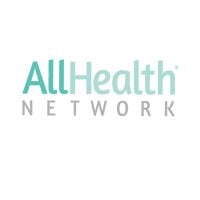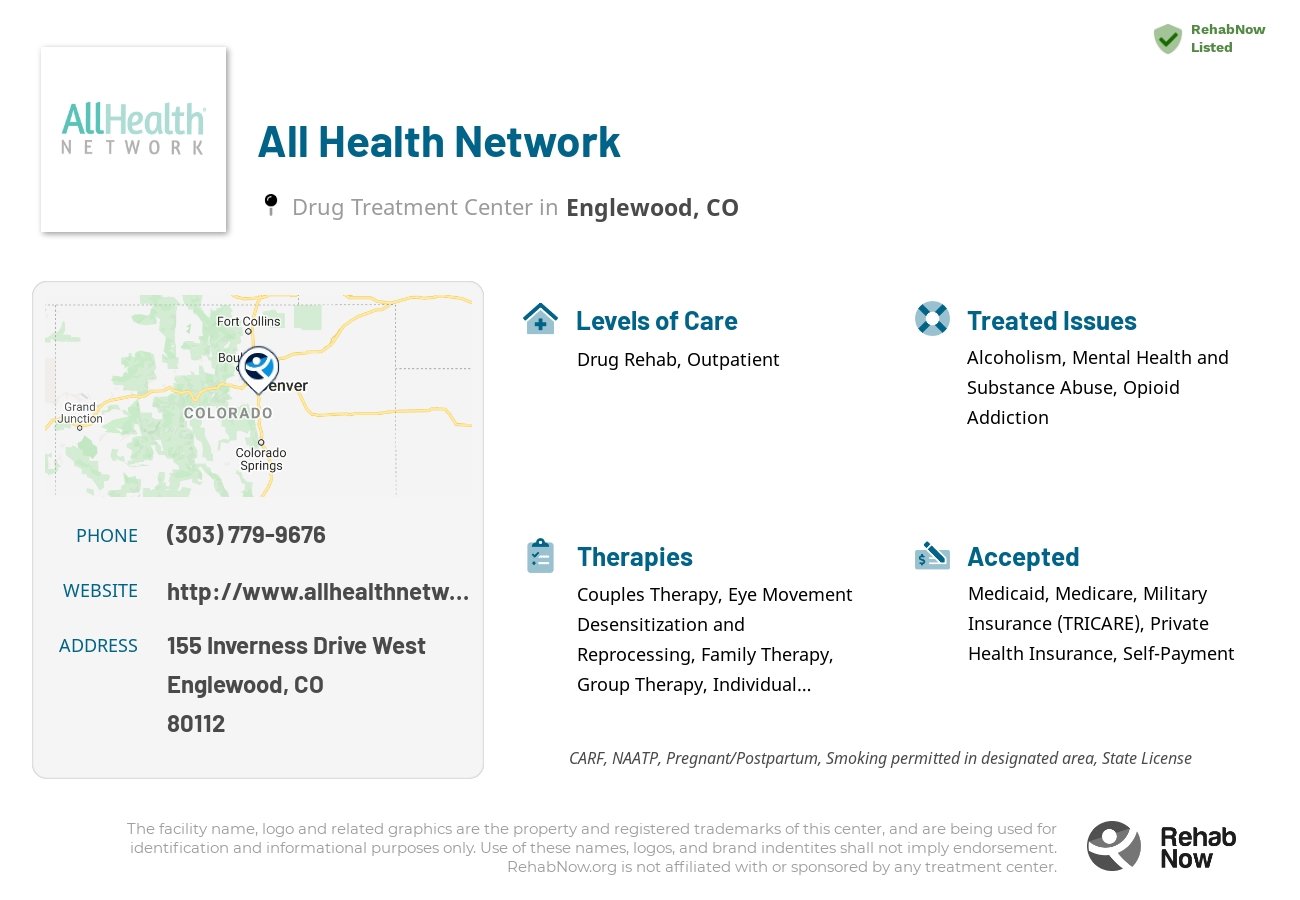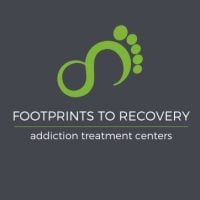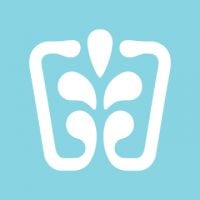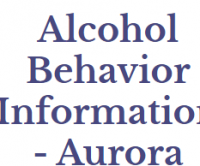All Health Network
Drug Rehab Center in Englewood, Colorado
All Health Network is an accredited, premier drug rehab and addiction treatment facility providing evidence-based, individualized therapy through both Outpatient Treatment (OP) and Residential Long Term (>30 Days) stays in Englewood, Colorado.
About All Health Network in Colorado
All Health Network in Englewood, Colorado, stands out for its comprehensive approach to tackling behavioral, emotional, and substance use issues. Since 1955, this not-for-profit organization has been dedicated to serving individuals across all ages with a variety of clinical services. Their unique blend of therapeutic approaches and in-house medical support makes them a pivotal resource for the community.
- Wide Range of Therapeutic Approaches: Utilizes cognitive behavioral therapy (CBT), EMDR, trauma-informed treatment, and more to address individual needs.
- Comprehensive Care for All Ages: Offers specialized counseling for children, adolescents, adults, and senior adults struggling with behavioral and emotional issues.
- In-House Medical Support: Equipped with doctors who can prescribe medication as part of a holistic treatment plan.
Accredited by LegitScript, All Health Network adheres to high standards of quality and ethical practices. Their Englewood facility is renowned for its effective treatment of alcoholism, opioid addiction, drug addiction, and dual diagnosis, providing a supportive and compassionate environment for recovery.
Specializing in alcoholism, opioid addiction, drug addiction, and mental health disorders, All Health Network employs a variety of treatment methods, including detox, outpatient treatment, and aftercare support, to offer personalized care and promote long-term sobriety.
Genders
Ages
Modality
Additional
Accreditations

LegitScript
Conditions and Issues Treated
Opioid addiction has become a significant health problem in the United States. In 2015, there were 91 opioid overdose-related deaths per day, with a substantial increase in mortality rate in 2014.
When opioid addiction has reached a point where a person’s life becomes unmanageable, treatment options are available to help them get sober. Treatment that includes medical care with medications and counseling can help a user transition into sobriety.
Levels of Care Offered
This center offers a variety of custom treatment tailored to individual recovery. Currently available are Drug Rehab, Outpatient, with additional therapies available as listed below.
Outpatient treatment is often used for drug addicts in drug rehab. Outpatient treatment consists of counseling and therapy sessions. This form of treatment is also called ‘day-treatment’. The outpatient treatment process begins with the addict’s initial detox period, lasting about ten days.
Outpatient treatment is used for those who are at moderate risk for ‘slipping back’ into the addiction, for those who:
- Are not currently experiencing any side effects from withdrawal and can handle social pressure
- Can handle stressors that might trigger relapse
- Have a stable living environment or have moved out of their previous environment, which was not conducive to being sober
- Have a support system that allows them to go to a facility a few times a week while still keeping their current responsibilities
- Have no legal obligations, being either on parole or probation, that require them to seek treatment at a mandatory facility
- Are not currently experiencing any side effects from withdrawal and can handle social pressure
- Have a stable living environment or have moved out of their previous environment, which was not conducive to being sober
Therapies & Programs
Because no single treatment is effective for all addicts, the goal of treatment and therapy should be to figure out what works best for each individual. Tolerance and withdrawal levels differ from person to person, affecting the treatment intensity required. Addiction treatment should aim to help addicts develop healthy coping mechanisms for dealing with their addiction and its underlying causes.
Couples therapy works with clients and significant others in a professional capacity to improve relationship dynamics. This can be helpful for addicts who are trying to marry the idea of recovery into their work, family, social lives – any aspect that has to do with relationships. Through counseling sessions, addicts will have an opportunity to talk about their addiction with professional partners.
Family therapy is beneficial for people who are in addiction treatment services because it offers addicts the opportunity to work with their family members to better understand what led them to make choices that contributed to their addiction.
This type of therapy helps family members reach a deeper understanding of how they can best support their loved one during recovery. It also helps the addict better understand their own motivations and triggers that led them to turn to substance abuse.
Family therapy can help addicts in the following ways:
- Assists family members in processing difficult feelings so they don’t blame or resent recovering addicts
- Assists family members in understanding how addiction has impacted the addict and everyone who is involved with them
- Allows the addict to take responsibility for their actions, while encouraging improved communication skills
- Helps family members understand how to best support an individual in recovery so addicts don’t relapse again.
Group therapy can help build a stronger support system and give addicts in Englewood, CO insight into their addiction that they gain through shared conversations. Group therapy occurs in a controlled group environment, exclusive of one on one meetings. This makes it safer for patients to feel comfortable sharing the struggles they’re going through and gaining perspective.
Trauma therapy is beneficial for people who are recovering from drug addiction because it helps them heal from past traumas that may have caused them to turn to harmful substances or led them to experience negative emotions that contributed to their destructive behaviors.
This type of treatment works by processing difficult experiences so individuals can learn how to process these events without having to turn to substances for coping.
Trauma therapy can help addicts in the following ways:
- Helps individuals understand their experiences and emotional responses to difficult events, including why they turned to drugs or alcohol
- Provides them with comfort and support while working through difficult emotions related to these traumatic experiences
- Offers an opportunity for addicts to have a voice and be heard, which can improve their self-esteem
- Can help them develop coping skills so they can better respond to triggers instead of turning to substance abuse.
Cognitive-behavioral therapy is a technique that is used to help people with addiction. Specifically, it is a way of identifying thoughts and behaviors that cause the addiction. It is typically used in an individual counseling session.
The content explains cognitive behavioral therapy and how it works to address some behaviors that may be leading to unintended consequences in their life, as well as its benefits for those seeking sobriety.
It works by helping people to talk through their issues and addressing the thoughts that cause said behaviors. It is an excellent way of learning about oneself and one’s perception of the world.
Eye Movement Desensitization and Reprocessing (EMDR) helps people get sober by changing how they experience emotions. EMDR is a psychotherapy treatment that has been widely studied with people who have addiction problems.
During the treatment, the patient is asked to recall specific memories that relate to their addictions. At the same time, they follow a moving object with their eyes or tap their hands or feet. This process helps the patient work through their emotions by separating the memory from the distress they feel about it.
By enhancing the brain’s information processing systems, EMDR enables people to “process” experiences that trigger cravings and painful emotions so that they can move forward in their lives.
Payment Options Accepted
For specific insurance or payment methods please contact us.
Is your insurance accepted?
Ask an expert, call (888) 674-0062
Additional Details
Specifics, location, and helpful extra information.
Englewood, Colorado 80112 Phone Number(303) 779-9676 Meta DetailsUpdated April 15, 2024
Staff Verified
Is All Health Network a LegitScript Verified Treatment Facility?
According to our most recent records, we have found this center to be LegitScript verified.
All Health Network Patient Reviews
There are no reviews yet. Be the first one to write one.
Englewood, Colorado Addiction Information
The Centennial State has slipped to a ranking of 12th in the country for drug abuse. Each year around 24% of the state's population uses illegal drugs while nearly 5% of its population abuses alcohol. Substance-related deaths in Colorado were responsible for 15.12% between 2008 and 2017. Fortunately, Colorado drug and alcohol addiction treatment are available to help a person overcome addiction.
In 2016, there were 577 opioid-related overdoses in Englewood, Colorado. Drug overdoses killed more than 64,000 men and women in 2016. Over 1,000 drug-related arrests were made in the past year. Nearly 2,000 people were admitted to local hospitals for issues related to drug abuse. There are several rehabilitation facilities in Englewood and the surrounding area.
Treatment in Nearby Cities
- Delta, CO (180.8 mi.)
- Julesburg, CO (168.7 mi.)
- Rocky Ford, CO (122.6 mi.)
- Longmont, CO (42.4 mi.)
- Springfield, CO (193.7 mi.)
Centers near All Health Network
The facility name, logo and brand are the property and registered trademarks of All Health Network, and are being used for identification and informational purposes only. Use of these names, logos and brands shall not imply endorsement. RehabNow.org is not affiliated with or sponsored by All Health Network.
